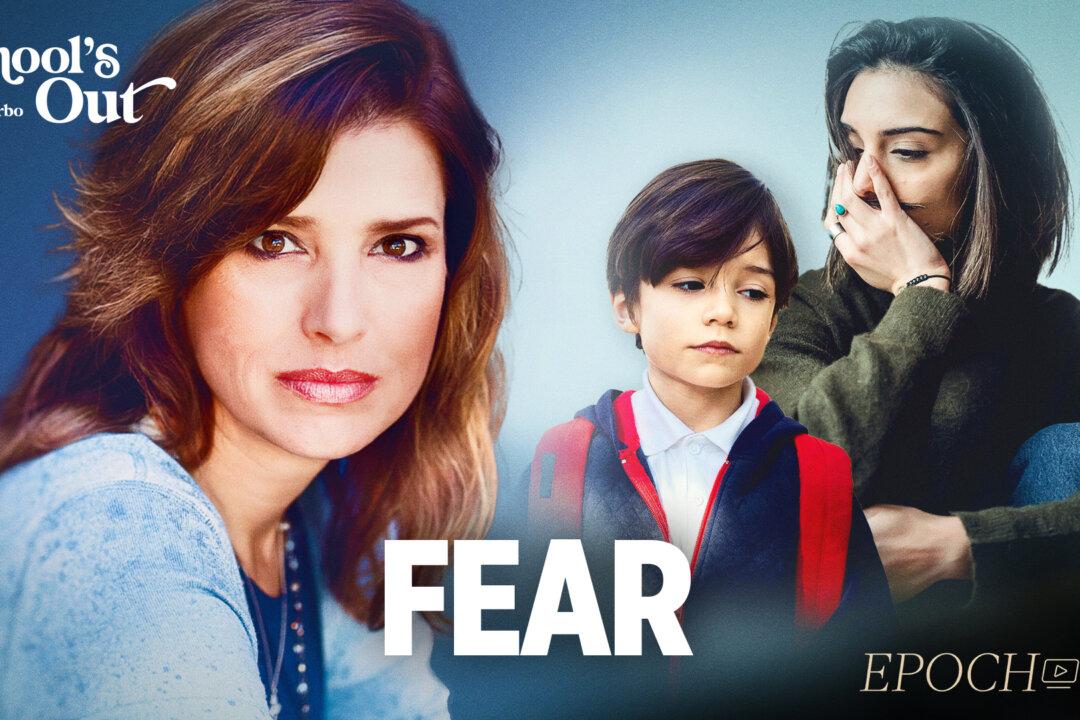“School’s Out with Sam Sorbo” is a series about education, primarily what you don’t know, what you should know, and what you can do about it. In this episode she talks about the unwarranted and conditioned fear parents have of failing to adequately educate their children themselves.
She says that we are all afraid of something, but we cannot let fear control our lives and keep us from being able to live with risk and unknowns. Sorbo talks of an email she received from a family whose parents were both public school educators, the father even being a university chemistry professor. You would think if anybody could home-school it would be them, but when they made their decision to self educate, their family was scandalized by it.
Common questions home-school parents receive have to do with socialization, and the big fear that their kid will turn out “like a freak,” says Sorbo, adding, “like there are no freaks in school.” This couple wanted Sorbo to know that their son was now grown, owned his own home, and was a successful, happy engineer, while his public-schooled cousins seemed to flounder in life, lacked good social skills, and led aimless lives.
“What is it about school that makes people think that a rowdy room full of sixth graders or a playground smackdown is effective socializing?” Sorbo asks.
Sorbo encourages parents struggling with fear and lack of confidence. “You can do this, even if you lack the ‘credentials.'”
She says that standing out from the crowd should not be feared, it should be admired, saying that the lack of forgiving our cancel culture has embraced is wrong and dangerous. “We want our kids to excel do we not? Yet we enroll them in a system that reinforces compliance and conformity.”
Sorbo encourages parents to acknowledge the sense of adventure in standing away from the crowd, pointing out that home schooling has more than doubled in the past year, meaning that parents really are not so alone after all.
However, the big fear among parents is the fear of failure. Sorbo reminds parents that failure is not the opposite of success, as we have been taught, but rather it is an integral and necessary component of success. As J.K Rowling said, “It is impossible to live without failing at something, unless you live so cautiously that you might as well not have lived at all, in which case you have failed by default.” Who would know better than Rowling, after 12 publishing houses turned down the first Harry Potter book?
“All creative endeavors require embracing the potential to fail,” Sorbo says, while acknowledging that we hate failure as a society, and suggesting that perhaps this is a learned fear due to ridicule, oftentimes in school itself.
Sorbo talks about how self-education is such a new paradigm, and many enter it with misguided conceptions because of their own schooling, which can make it difficult to break in order to see the truth. She talks about conversations with moms who were afraid to home-school because of the fear they will fail their children. The advice she gives these moms is that they can’t fail, they won’t fail, because they are her children, and she loves them. She also reminds them that failure or success will not be decided today or next week or next year. Parents will have time to regroup, reevaluate, and redirect. They will have people and resources to help them in their journey.
She encourages parents to ask themselves, what are you truly afraid of? Is that fear justified? Do you have the ability to read, write, reason? Do you have any accomplishments to your name? Did you believe the lie that you are incompetent because the teacher said so? Will you admit that you personally have something to offer or are you designed to be superfluous?
“This entire miracle of a country was founded by home-schooled individuals, self-taught individuals, intellectual giants who still by today’s standards were absolute geniuses,” Sorbo reminds her listeners. “For them, the Bible, history, and common sense were all they needed.”
The Magna Carta and the Mayflower Compact were enough to inspire the Constitution that would set the course of freedom for the world. These Founding Fathers and historical figures were committed to hard work, they dedicated their minds, and they showed tremendous courage despite the intimidation of the world’s greatest superpower, Great Britain.
Many educators in the media over this past year have talked about how children may fall behind due to the COVID-19 lockdowns and shutting down of schools. Sorbo points out that what was missing from all the mainstream media reporting were articles on how to actually succeed with educating children at home, after parents were virtually abandoned by their public schools. She says it’s almost as if the schools and media outlets didn’t even want parents to try.
Sorbo talks about her friend who sent her a video from their school. The video was from teachers to students. In the video, the teachers repeated that they wished they could be together and often told the kids to wash their hands and stay safe. Nowhere did a teacher actually mention education, by saying something like “keep reading,” or “practice your spelling words and math assignments,” or “I can’t wait to talk about Winnie the Pooh with you.” She said although the video was a nice gesture, it was so very lacking. The simplest explanation for why a school would send out a video that had nothing to do with education is that the schools are not primarily centers for education, but rather centered on compliance. Sorbo calls the school system a training ground for behavior modification, that has no interest in education, but is beholden to the great god of government, compliance.
The antidote to fear is courage. As Franklin Delano Roosevelt said, “Courage is not the absence of fear, but it is the determination that something else is more important.” Our children are something else. They should occupy the place of supreme importance in which no challengers are matched. “So tell your fear to take a hike,” says Sorbo, encouraging parents to put fear into perspective. She admits that deciding to educate children yourself takes courage, primarily because culture expects you to fail and the education system tries to diminish your confidence.
However, Sorbo reminds parents that just because society thinks that way doesn’t make it true, citing multiple testimonies of home-schooled children winning national spelling, math, science, and technology competitions, as well as achieving overall happiness and success in life. “Children who are decidedly different struggle in a one-size-fits-all environment. But when you give the child the opportunity to pursue his own interests, you have opened up the world for him.”
Confining a child to sit for seven hours a day learning what the government has deemed necessary will shackle them, and worse, discourage them from original thought.
Maybe your child isn’t a genius, but maybe he or she has the brain power to create, or the compassion to compose. The last thing we should want to do is sentence that child to conform instead. Many of today’s thought leaders were rebellious about school, including many current tech giants who dropped out of school at some point. Tesla billionaire Elon Musk himself says that jobs at his company shouldn’t require a degree.
“The world is changing, but people are afraid of change,” Sorbo says, encouraging parents not to shy away from it, but to embrace it and get on board. She says to be grateful for it, because your children are your legacy and the future.
“Recognize the economic and practical revolution that is happening right under your nose and harness it for the good of your family and your children,” she says.
It takes courage, but parents love their children and want to give them the best shot at a successful life, as well as wanting to have good relationships with them, talk together, and share their values.
Sorbo tells parents to do their research and find others who are stepping out and not relinquishing power to the system but confronting their fear head on and doing what is best for their children. She says to be part of this new breed of parents.
The episode also dives into the belief that public education is primarily about behavior modification. According to the Organization for Economic Cooperation and Development, the United States is now only average in international education rankings. A decades-long decline in quality of education should at least make us raise our eyebrows and ask what we are paying for.
By leaving the school system, parents are leaving the system that is keeping them from making this decision to begin with.
Sorbo ends with telling parents to pursue what they want for their children without being hindered by fear.
“Everything carries risk, but life is meant to be an adventure. Aren’t you tired of being told not to try out of fear of failure? Quiet that voice in your head.”
Follow EpochTV on social media:






